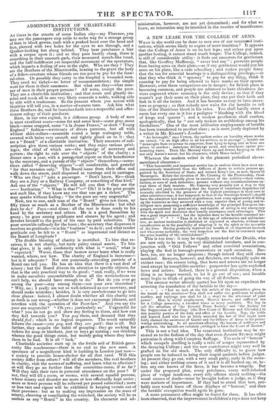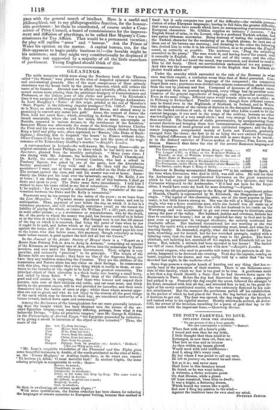A NEW LEASE FOR THE COLLEGE OF ARMS. WHAT in
the world can be done to save one of our venerated insti- tutions, which seems likely to expire of mere inanition ? It appears that the College of Arms is on its last legs; and unless put upon another footing, it cannot stand much longer. The College, indeed, is still of considerable utility: it finds out ancestors for gentlemen that, like Geoffrey Muffincap, " never had any " ; prevents people from having arms on their plate,—as if any gentleman would put his arms on his plate, like a rude schoolboy ; and makes people fancy that the tax for armorial bearings is a distinguishing privilege,—so that they who think it " spooney " to pay for any thing, think it cunning to pay for being allowed to have marks on their spoons. However, even these occupations are in danger ; for British plate is becoming common, and people are ashamed to have chivalrous de- vices engraved where economy is the only device ; so that if they mustn't put their arms on their plate, they can put their knife and fork in it all the better. And it has become as easy to have ances- tors as progeny ; so that nobody now waits for the heralds to tell him of the illustrious blood in his veins. You shall hardly enter a room but every one in it has a pedigree "blushing with the blood of kings and queens "; and a modest gentleman shall confess, apologetically, that he "can only reckon an archbishop among his forefathers." One of the most utilitarian employments of heralds has been transferred to another class ; as is most justly deplored by a writer in Mr. KNIGHT's London- " An hereaught," says UPTON, the earliest writer on heraldry whose works are extant. "is an high office in all his services, as in message "; heralds are " messengirs from emperour to emperour, from kyng to kyng, and so from one prince to another ; sometyme declarynge peace, and sometyme againe pro- nouncing vrarre. Theis like Mercury runne up and downe, havyiug on them not only Aaron's surcot, but his eloquence, which Moses lacked."
Whereon the modern writer in the pleasant periodical above- mentioned observes-
" This honourable and important service has in modern times been most un- ceremoniously transferred from the Officers of Arms to certain persons ap- pointed by the Secretary of State, and termed King's (or, as now, Queen's) Messengers. Before the elevation of Mr. Canning to the Premiership, these appointments were generally given to nominees of the nobility—their valets, butlers, or sons of such domestics; persons without any recommendations ex- cept those of their masters. Mr. Canning very properly put a stop to this practice ; and justly considering that the bearers of important despatches (of necessity admitted to the presence of the highest personages in their own or other countries—nay, it has happened, to that of the Sovereign himself) should have the education and manners of gentlemen, took every opportunity of filling up the vacancies as they occurred with a very superior class of young and in- telligent men, possessing a sufficient knowledge of the principal European lan- guages, accustomed to good society, and capable of acting in any emergency with the spirit and discretion that usually accompany such advantages. This was a great improvement ; but the injustice done to the heralds remained un- redressed." • • "Thus it is in this age of reformation and utilitarian- ism, an ancient institution is abolished or neglected as obsolete, without one consideration as to the possibility of adapting it to the spirit or the necessity of the time. Having gradually deprived the heralds of all important business and wholesome authority, the very despoilers are the first to comment upon the utter inutility of the establishment I "
This is too true : it may be equally remarked of the Druids, who are now only to be seen, in very diminished numbers, and in con- junction with "Odd Fellows" and other convivial associations, playing the fool in borough-processions or such occasions. Bar- bers, too, are no longer surgeons ; though indeed they still shave mankind. Bowyers, however, and fletchers, are unhappily quite an extinct race; the reason being, that bows and arrows are no longer used except by toxophilite societies : gunpowder has quite exploded bows and arrows. Indeed, there is a general disposition, when a thing is no longer wanted, to let it go out of use; and heralds must begin to think of going the way of all fletchers.
The earnest writer already quoted has hit upon an expedient for arresting the translation of the heralds to the sky-
" Let us look at the 6th article of the admonition given to the herald on his creation—,You shall not suffer one gentleman to malign another, and raylynge you shall let (i. e. stop) to the uttermost of your power.' Here is useful employment, Heaven knows, and sufficient too for a College possessing a hundred times as many members. We beg to call the attention of the General Peace Society,' and 'the Society for the Suppression of Duelling,' (the New Court of Honour and Chivalry,) to this peculiar portion of the duty and office of the heralds. Nay, the noble and learned Lord who has so lately amended the law of libel might have fairly claimed the assistance of Garter and the Officers of Arms in his praise- worthy undertaking. In all questions affecting the honour of noblemen and gentlemen, the heralds are certainly privileged to form the Court of Review."
This is not a had idea. The venerated institution may be re- stored so to the fashion of the day that even JOSEPH STURGE might patronize it along with Complete Suffrage. The code of" honour" which compels duelling is really a relic of usages represented by the decaying College ; and the new contrivance might very well be grafted on the old stock. The only difficulty is, to guess how people can be induced to bring their stupid quarrels before judges. At present they go out, with a very small party, early in the morn- ing; and either nothing comes of it and it is all hushed up, or, be- fore any one knows of the farce, it has become a tragedy. But under the proposed plan, every petulance, every well-rebuked piece of vulgar insolence, every silly offence about nothing—the usual causes of duels—must be brought before a judge, as if they were matters of importance. If they had to stand that test, pro- bably men would leave off those displays of "honour," and then the heralds' occupation would again be gone.
A more permanent office might be found for them. It has often been observed, that the improvement in children's toys does not keep
pace with the general march of intellect. Here is a useful and philosophical, not to say philoprogemtive function, for the honour- able gentlemen : let them be constituted, of course under a Com- mittee of Privy Council, a board of commissioners for the improve- ment and diffusion of playthings, to be called Her Majesty's Com- missioners for Toy Affairs. That would be a permanent vocation; for play will outlive " arms " and "honour." Ask the Prince of Wales his opinion on the matter. A capital bureau, too, for the Heir-apparent to begin public business in l—the heralds might be his ministers ; and they might very constitutionally be displaced if they were not supported by a majority of all the little munchers of parliament. Young England should think of this.



























 Previous page
Previous page